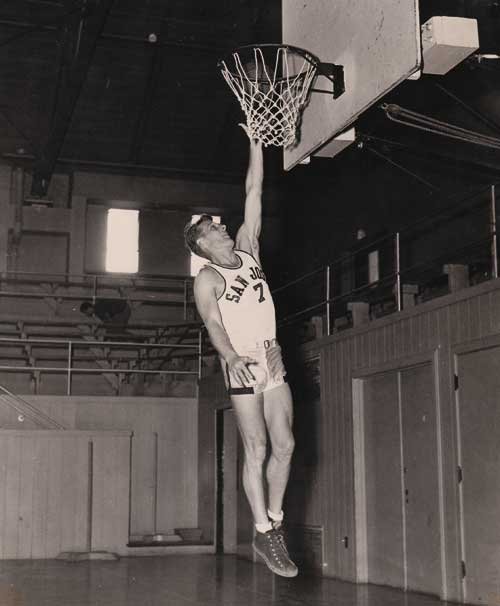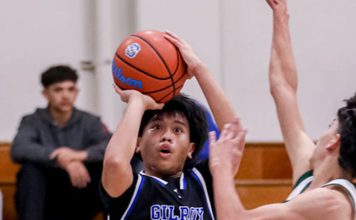In a way, I feel like I knew Bob Hagen.
For anyone whose father was a coach, you’ll know what I’m
talking about.
Wednesday night, I stood in Hagen’s dining room talking with the
late coach’s wife, Maggie, and his daughter, Karen, and the
memories came rushing back. Late night trips returning home from
games on a bus full of ballplayers brimming with enthusiasm,
sitting near the rafters of dilapidated gyms to scout upcoming
opponents, talking hoops until the wee hours of the night – this
was my life growing up. Similar to Hagen’s children, many of my
sports memories revolve around tagging along with my dad, the
coach.
In a way, I feel like I knew Bob Hagen.
For anyone whose father was a coach, you’ll know what I’m talking about.
Wednesday night, I stood in Hagen’s dining room talking with the late coach’s wife, Maggie, and his daughter, Karen, and the memories came rushing back. Late night trips returning home from games on a bus full of ballplayers brimming with enthusiasm, sitting near the rafters of dilapidated gyms to scout upcoming opponents, talking hoops until the wee hours of the night – this was my life growing up. Similar to Hagen’s children, many of my sports memories revolve around tagging along with my dad, the coach.
Hagen spent his life getting the best out of kids on the court, and, as a result, he’s the best coach Gilroy High has ever known.
My dad, who would be celebrating his 52nd birthday today if he was still alive, probably would have been friends with the man. I’m willing to admit, though, Hagen’s teams most likely would have beaten the tar out of my father’s. The resume is just too strong: 450 victories, 13 league titles, a National Coach of the Year award – Hagen was no ordinary coach.
Taking over the GHS basketball program in 1951 after a Hall of Fame career as a swingman with San Jose State, his accomplishments in 27 years on the job are unlikely to be unsurpassed. The impact he had on those who knew him is even more unlikely to be forgotten.
When he died of a heart attack in November of 1977, Maggie received enough letters from former players, fellow coaches and simple acquaintances to fill several cardboard boxes. When my dad died in a car accident, people I had never met took time to send me letters about things he had done for them. Halfway through the first is as far as I got. Maggie made it through more than I did, but she admits she hasn’t read them all.
“Well, from what I gather, the youngsters that played for him, and I’m still getting reports, they still remember what they learned through playing for him,” she says.
Karen continues to hear stories about how her father wouldn’t put up with any nonsense when acting as the overseer at the local rec swimming pool.
“Kids (at that time) remember him, too, because he started the Gilroy Gators program and recreation pool system,” she says. “People would say, ‘I remember when your dad would kick me out for hanging on the ropes.’ ”
You know your dad was well-liked when people look back fondly on being kicked out of the pool on a hot summer day.
Hagen was an avid golfer and coach of the game, a P.E. teacher, history teacher and president of the Gilroy Teachers Association. My father was a history and government teacher, and coached a range of other sports. Basketball came first for both, though.
Hagen started the Notre Dame girls basketball program in Salinas, and consistently assembled the best cagers – a term used to refer to basketball players in those days – Gilroy has ever seen.
“Bob loved, I mean, he loved practice,” says Rich Freedman, an assistant under Hagen in 1974-75 and head coach at GHS from 1979-82. “He really loved the X’s and O’s. To him, it was a big chess game and there was nothing he liked better than finding out how to beat somebody else or make something work.”
Hagen’s personal record book, bound in a faded orange cover with notes of all sorts scribbled in all directions, tells the story. The cover alone indicates he was a man that was always on the go. There are meeting times, registration dates, game locations, shopping lists and words – “Philosophy, Principle, Policy, Procedure, Carrover” – that appear to be the bedrock of how he coached, as well as conducted himself off the court.
The book is one of the final items I left Maggie’s home with that night and it might as well be the Holy Grail of Gilroy hoops.
Every team and individual statistic of every single season he coached at GHS is up to date. Win-loss records with game scores precede a playbook that would work in any era. The motion offense, flex sets, off-ball maneuvers one would expect to see from a wide receiver, press-breakers and diagrams of how to trap a ballhandler after he crosses halfcourt, while also taking away passing lanes, are among the dozens of strategies he documented over the years.
One note reminds him to use a “Spread Series” of offensive plays revolving around staggered screens during the 1963-64 season. Gilroy went 24-2 that year after going 24-1 a season prior.
There is no doubt his intelligence for the game matched his passion.
As Karen recalls, he was known to calmly rise out of his chair, walk behind it, and rest his coat over the back. Seconds later, Hagen would be flinging the piece of furniture away in disgust. The pounding those chairs took became somewhat of a ritual, as he was given a folding seat with his name on it.
My dad once made me spend an hour watching a five-second video clip of him being ejected from a game so I could confirm that he had, indeed, not given the referee the bird. Whether he deserved to get kicked out is another story.
Both had a sense of humor which helped them win people over. Hagen reportedly could give it even better than he took it.
“I think we may have gotten the best of Bob once. The other times he was always on top of us,” Bert Duke, a math teacher at GHS, was quoted as saying in a piece written by the Dispatch’s Mark Soltau shortly after Hagen’s passing.
In his second year on the job as head coach at Gilroy, Freedman, who returned to the school after Hagen helped him get a job coaching at James Lick High School in San Jose, made the decision to start the Bob Hagen Memorial Tournament. This year’s tournament, which began Thursday, marks the 29th edition of the classic. It is being hosted in a gymnasium also named after the legendary coach.
“He had so many great years of service and great teams in Gilroy, I just wanted to do something to honor his memory,” Freedman says.
I suppose I tried to do something similar by comparing my father to such a legend in this column, and it could be a stretch. But the son or daughter of a coach will understand. I feel like I knew Bob Hagen. A good coach’s lessons last long after everyone has left the court.













